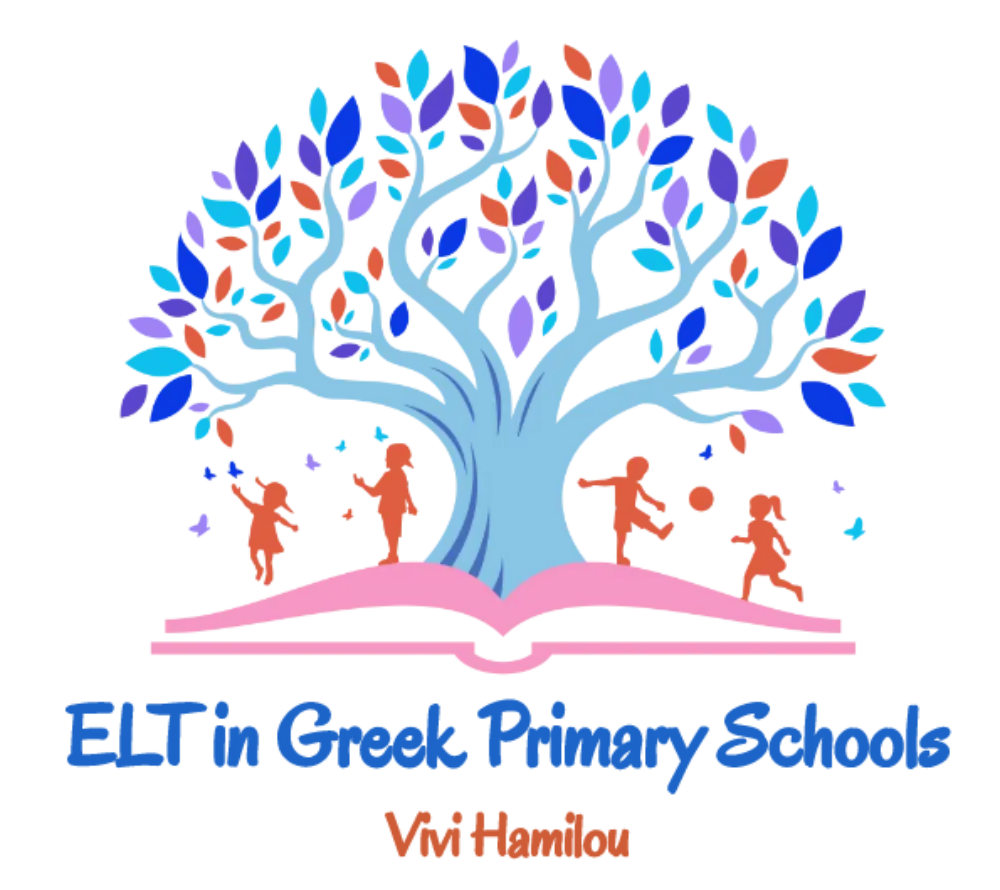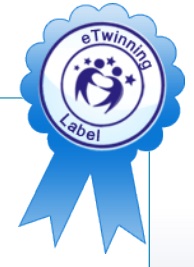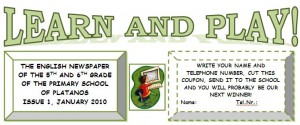Με πολύ όρεξη και μεράκι, ολοκληρώθηκε το 2ο τεύχος της σχολικής μας εφημερίδας στα Αγγλικά! Μαζί με τους Ευρωπαίους φίλους μας, παρουσιάσαμε με κείμενα, ζωγραφιές και φωτογραφίες τα σχολεία μας, σε μια προσπάθεια να γνωριστούμε ακόμη καλύτερα, να διευρύνουμε τους ορίζοντές μας και να εξασκηθούμε στα Αγγλικά! Δείτε εδώ το δεύτερο τεύχος της εφημερίδας μας “The European Schools Newspaper”.
Tag: school newspaper
ΣΧΟΛΙΚΗ ΕΦΗΜΕΡΙΔΑ ΣΤΑ ΑΓΓΛΙΚΑ – ΔΗΜΟΤΙΚΟ ΣΧΟΛΕΙΟ ΣΟΥΡΠΗΣ – 1ο ΤΕΥΧΟΣ
Συνεχίζοντας την περσινή παράδοση της δημιουργίας σχολικής εφημερίδας στα αγγλικά, οι μαθητές των τριών τελευταίων τάξεων του σχολείου μας ένωσαν τις δυνάμεις τους για το πρώτο τεύχος που είναι ήδη έτοιμο! Φέτος, το κάθε τεύχος ολοκληρώνεται σε συνεργασία με άλλα Ευρωπαϊκά σχολεία και είναι θεματικό. Στα πλαίσια του Ευρωπαϊκού προγράμματος eTwinning, υποβάλαμε και συμμετέχουμε στο project που ονομάζεται The European Schools Newspaper και, σε συνεργασία με άλλα σχολεία της Ευρώπης, δημιουργούμε το κάθε τεύχος που, κάθε φορά, θα επικεντρώνεται σε ένα θέμα!

Το θέμα του πρώτου τεύχους είναι All about me! Οι μαθητές της Ευρώπης συστήνονται μεταξύ τους και παρουσιάζουν τον εαυτό τους με λόγια, ζωγραφιές ή/και φωτογραφίες! Δείτε παρακάτω το απόσπασμα του πρώτου τεύχους που συνεισέφεραν οι μαθητές του σχολείου μας:
Κι επειδή 5 σελίδες δεν είναι αρκετές να χωρέσουν όλα τα άρθρα των παιδιών που συνεισέφεραν, δείτε παρακάτω τα άρθρα όλων των παιδιών, όπως αυτά παραδόθηκαν σε μας:
Διαβάστε εδώ το πρώτο συνεργατικό τεύχος μας!
CARNIVAL IN GREECE – English School Paper, February 2011 Issue
CARNIVAL IN GREECE
Since the beginning of this school year the learners in the Primary School of Pteleos exchange presentations of national customs and traditions with other European Primary Schools. Here is what our 5th graders wrote about the Carnival celebrations in Greece.
CARNIVAL CUSTOMS AROUND GREECE
by Kosmas Gourgiotis
Naoussa. In Naoussa, every year people celebrate the custom of “Yenitsari” and “Boules” which has its roots since when Greece was under Turkish occupation. Yenitsaroi are men dressed in traditional Greek costumes and Boules are also men dressed-up as women. They all wear masks.
Halkidona. In New Halkidona, in Thessaloniki, Greece, people celebrate the Carnival playing yogurt fights. They throw yogurt at each other!
Skiros. In Skiros, people celebrate the custom of “the old man of Korela”. They wear the traditional costume of the sheppard and they hang big bells around their waist.
Naxos. In Naxos, men wear traditional Greek costumes and go around the neighborhoods and sing.
Galaxidi. People in Galaxidi have a strange, but funny carnival custom. On Clean Monday they throw flour and ashes at each other, so they turn white and in a minute they’re all covered in black! It is a very funny tradition and many people visit Galaxidi to participate in this traditional game!
Patra. Patra is one of the famous destinations during the carnival. People in Patras participate in a long carnival parade, dressed up in different costumes. There is also a treasure hunt game!
Clean Monday
by George Papargiris
Clean Monday is a big celebration in Greece. People eat seafood and vegetables. This day in the morning the people go in the countryside or the mountain and they fly a kite. They have a picnic there. Clean Monday is a very good and enjoyable celebration. Children usually have lots of fun!
Clean Monday
by Danae Xiromeriti
Clean Monday is the opening day of the fasting for the Greek Orthodox Church and it means the end of the Carnival. It was named like this because the early Christians used to clean their body and soul on that special day, preparing themselves for the Easter holidays. Fasting lasts 40 days, the same as the days Jesus spent in the desert. On Clean Monday it is common that we eat ‘lagana’, which is a flat loaf of bread, and beans soup without oil. Traditionally, it is the last day of the year we can dress up for the carnival and we go out and fly kites. Clean Monday is celebrated 48 days before Easter. For more information, you can visit: http://en.wikipedia.org/wiki/Clean_Monday
GAΪTANAKI
by Valentina Velikova
Gaitanaki is a traditional Greek dance that we dance during the carnival. It is a colourful and funny dance!
We need 13 people for this dance! One person is holding a wooden pole with 12 ribbons hanging from its top. The ribbons have different colours and every person is holding a ribbon.
When the music begins, the dancers move towards the pole, go under the other dancer’s ribbon, move far from the pole and then towards the pole again! A colourful braid is created on the pole when the dance finishes.
This dance is a symbol of the circle of life. We move from happiness to sadness, from winter to spring, from life to death and the opposite!
A CARNIVAL GAME
by Danae Xiromeriti, Helen Kaltsouni and Helen Alamanioti
During the carnival Greek people organize many games for children to play. Sometimes they win and sometimes they lose! Sometimes they dress up, and sometimes they don’t!
Valmas was a game that was played in the village of Penia. There were two teams and each one was tied on each side of the rope. The winner was the team that dragged the other team towards its side. It was a special game because after the game they had funny dialogues, like a play.
CARNIVAL IN PTELEOS
People celebrate the carnival all around Greece. In our village, the carnival celebrations take place on the last Sunday of the carnival period, just before Clean Monday. This year, we celebrated the carnival in the central square of our village on March 6th.
The celebration this year was great! The local choir sang beautiful traditional songs. Our school participated in the celebrations, too! Our PE teacher, Mrs. Despina Founta, taught us the traditional dances. We danced the traditional ‘Gaitanaki’ and the ‘Pepper’ song, which was a lot of fun. We also danced some other Greek traditional songs.
A great party followed our presentation of the dances and in the end we burnt the king of the carnival in a big fire that people lit in the central square.
English School Newspaper – January 2010 Issue – P/S Platanos
Learn and Play s the English school newspaper we created with the 5th and 6th grade learners of the Primary School of Platanos, Magnesia, Greece, during the school year 2009 – 2010. Here is our January 2010 issue:
School Paper – November 2009 Issue – 1 P/S Almyros
InfoMANIA is the bilingual (Greek – English) school newspaper we created with the learners of the 1st Primary School of Almyros, Magnesia, Greece during the school year 2009 – 2010. Here is our November 2009 Issue:
School Newspaper – February 2010 Issue – 1 P/S Almyros
InfoMANIA is a bilingual (Greek – English) school newspaper we created with the learners of the 1st Primary School of Almyros, Magnesia, Greece during the school year 2009 – 2010. This is our February 2010 issue:
ENGLISH SCHOOL NEWSPAPER – ISSUE 1 – PRIMARY SCHOOL OF PTELEOS
ΣΧΟΛΙΚΗ ΕΦΗΜΕΡΙΔΑ ΣΤΑ ΑΓΓΛΙΚΑ
ΔΗΜΟΤΙΚΟ ΣΧΟΛΕΙΟ ΠΤΕΛΕΟΥ, ΜΑΓΝΗΣΙΑ
Τις περισσότερες φορές, η ανάθεση γραπτών εργασιών στο σπίτι προκαλεί τη δυσανασχέτηση των μαθητών και αυξάνει το άγχος τους να ανταπεξέλθουν στις απαιτήσεις του σχολείου, πολύ περισσότερο δε όταν πρόκειται για συγγραφή κειμένου στα αγγλικά! Σε μια προσπάθεια να κάνουμε τη διαδικασία αυτή καταρχήν πιο ευχάριστη, αποφασίσαμε από κοινού με τους μαθητές των Δ’, Ε’ και Στ’ Τάξεων του Δημοτικού Σχολείου Πτελεού να προχωρήσουμε στην έκδοση σχολικής εφημερίδας στα Αγγλικά.
Οι βασικοί στόχοι ενός τέτοιου εγχειρήματος αποσκοπούν στη βελτίωση της παραγωγής γραπτού λόγου στα αγγλικά, αλλά και στην εξοικείωση των μαθητών με διαφορετικά είδη γραπτού λόγου (άρθρο, δοκίμιο, ποίημα, κτλ). Εκτός όμως από την εξοικείωση των παιδιών με το περιεχόμενο και το ύφος ανάλογα με είδος του γραπτού κειμένου, προωθούνται και άλλοι, δευτερεύοντες, αλλά εξίσου σημαντικοί στόχοι. Καταρχήν, επιδιώκεται η συνεργασία με τους συμμαθητές τόσο για την έρευνα, όσο και για την συγγραφή των κειμένων, συμβάλλοντας έτσι στην κοινωνικοποίηση, αλλά και την αύξηση της αυτοπεποίθησης των μαθητών μας. Επίσης, τα παιδιά έχουν τη δυνατότητα να εξοικειωθούν με τη χρήση του internet, του κειμενογράφου, της εγκυκλοπαίδειας και του λεξικού.
Επιδιώκοντας να προσδώσουμε μια πιο αληθινή διάσταση στη συγγραφή της εφημερίδας μας, το Δημοτικό Σχολείο Πτελεού εντάχθηκε στο πρόγραμμα ηλεκτρονικής αδελφοποίησης Ευρωπαϊκών σχολείων eTwinning. Υποβάλλοντας το σχεδιασμό ενός project με την ονομασία “I’ve got news for you”, καλέσαμε άλλα Ευρωπαϊκά σχολεία που εκδίδουν σχολικές εφημερίδες στα αγγλικά σε μια ανταλλαγή εφημερίδων, με σκοπό να προσομοιάσουμε τη συγγραφή κειμένων όπως αυτή συντελείται στην πραγματικότητα, με στόχο, αλλά και συγκεκριμένο αναγνωστικό κοινό. Στην προσπάθειά μας αυτή βρήκαμε ήδη συνεργάτες και έχει ήδη ξεκινήσει η ανταλλαγή σχολικών εντύπων στα αγγλικά. Τα συνεργαζόμενα σχολεία είναι: St Mary’s primary Duntocher, Clydebank, Ηνωμένο Βασίλειο, Ulubatlı Hasan İlköğretim Okulu, Kocaeli, Τουρκία, Szkoła Podstawowa nr 1 im. Feliksa Nowowiejskiego w Barczewie, Barczewo, Πολωνία, Samanyolu Ilköğretim Okulu , Ankara, Τουρκία και Öğretmen Mediha Mehmet Tetikol İlköğretim Okulu, Tekirdağ, Τουρκία. Επιπροσθέτως, σε μια προσπάθεια έκθεσης των μαθητών σε όλο και περισσότερα γραπτά συνομηλίκων τους που έχουν την αγγλική ως μητρική τους γλώσσα, και άρα την βελτιστοποίηση της κατανόησης γραπτών κειμένων στην αγγλική των μαθητών μας, έχει ήδη συναφθεί συνεργασία με το σχολείο Cushing Middle School, στην Οκλαχόμα των Η.Π.Α. Έτσι, οι μαθητές μας θα έχουν τη δυνατότητα να συνειδητοποιήσουν στην πράξη την ευρεία χρήση της αγγλικής γλώσσας, τις δυνατότητες που τους παρέχει η γνώση της, αλλά και να νοιώσουν σαν πολίτες του κόσμου, διευρύνοντας τους ορίζοντές τους!
Στα πλαίσια της έκδοσης του πρώτου τεύχους της εφημερίδας μας, την Πέμπτη 9 Δεκεμβρίου 2010 επισκεφθήκαμε τους χώρους έκδοσης της τοπικής εφημερίδας «ΘΕΣΣΑΛΙΑ», όπου οι μαθητές μας είχαν τη δυνατότητα να εξοικειωθούν με τη διαδικασία εκτύπωσης μιας εφημερίδας, αλλά και να μάθουν περισσότερα για τον τρόπο που αυτή συγγράφεται, εκδίδεται και προωθείται. Η ξεναγός μας, κα Χραπάλου, με μεγάλη υπομονή, περιγραφικότητα και ευχάριστη διάθεση, εξήγησε κατανοητά στους μαθητές μας τις διαδικασίες, απάντησε πρόθυμα στις ερωτήσεις που είχαν ετοιμάσει υπό την μορφή ερωτηματολογίου, αλλά και εντυπωσίασε μαθητές και εκπαιδευτικό προσωπικό με την παρουσίαση παλαιοτέρων τευχών του 1925 της εφημερίδας «ΘΕΣΣΑΛΙΑ», η οποία εκδίδεται από το 1898! Την ευχαριστούμε θερμά για όλα!
Η αγγλική εφημερίδα μας ονομάζεται “OUR WORLD” και, αποσκοπώντας στην μεγαλύτερη εξοικείωση των μαθητών μας με την τεχνολογία, της δώσαμε και ηλεκτρονική διάσταση μέσα από το σχολικό ιστολόγιο (blog) που δημιουργήσαμε, όχι μόνο για την προβολή των άρθρων που συγγράψαμε, αλλά και για την προβολή άλλων εργασιών και εκδηλώσεων του σχολείου μας (https://blogs.sch.gr/dimptemag/).
OUR WORLD – December 2010 – Issue 1[1]
This is the first issue of the English school paper of the Primary School of Pteleos, Greece, as it was printed and distributed!






